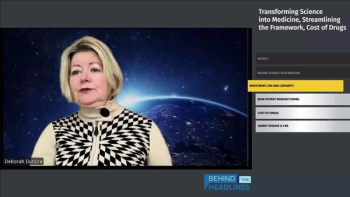On June 20, the United Kingdom government announced plans to sequence the genomes of every newborn in England as part of an ambitious effort to identify a broad range of genetic conditions early in life (1). Supported by a £650 million (approximately $US820 million) investment in DNA research through 2030, the initiative is expected to be a key component of the National Health Service (NHS)’s upcoming 10-year strategic plan.
Oxford-based biotech firm SynaptixBio, which develops therapies for rare neurological diseases, welcomed the move but urged government leaders to provide a clear operational roadmap for delivery and family support (2).
Key Takeaways
·UK newborn genome sequencing program to expand early rare disease detection. Pharmaceutical developers should prepare for increased demand for precision therapies.
·SynaptixBio advances antisense oligonucleotide therapy for TUBB4A leukodystrophy. Emerging RNA technologies continue gaining traction in rare disease pipelines.
·$820M UK investment in genomic data infrastructure to support drug discovery. Manufacturers should anticipate opportunities in personalized medicine production.
“Rare diseases are primarily genetic in origin, indeed most are the result of single gene mutations,” said Dan Williams PhD, CEO of SynaptixBio. “Unfortunately, most are currently untreatable, so identifying them shortly after birth maximizes the opportunities to develop personalized care plans and access appropriate support, which can be life-changing for those affected and their families.”
SynaptixBio urges government to back ambition with action
The new national program will rely on whole genome sequencing using blood samples collected shortly after birth (1). It aims to identify genetic conditions that might not be diagnosed until symptoms emerge—often after irreversible harm has been done. As reported by the BBC, the initiative builds on a pilot study launched by the NHS in 2023, which limited screening to childhood diseases with available treatments (3).
Williams, who previously advocated for broader newborn screening, called the latest announcement an important milestone but warned that infrastructure and resources must keep pace (2). “Ambitious plans like this can only succeed if the necessary underpinning elements are also in place,” he said. “Resources to undertake testing, process test results, and support families are just three of those elements. Overall, this new announcement is wonderful news. But it would be good to know that it will be backed up by credible and achievable plans that take into account the multiple other demands on the NHS.”
Building the genomic ecosystem for drug development
Alongside its diagnostic goals, the initiative includes funding for Genomics England to expand its research database, with a target of more than 500,000 sequenced genomes by 2030 (3). The database is expected to support not only disease detection but also the development of new therapies and precision medicine approaches.
SynaptixBio is one of several UK-based companies working in the rare disease space that could benefit from these advances (2). Founded in 2021, the company is developing a therapy for hypomyelination with atrophy of the basal ganglia and cerebellum, or H-ABC, a severe degenerative disorder caused by mutations in the TUBB4A gene. It recently selected a lead candidate for clinical development.
“Identifying a candidate drug is incredibly important,” said Williams (2). “It means the drug has passed toxicity tests and is stable. We are looking forward to getting into the clinic, though trials in the rare disease space are a lot harder to design due to the limited number of patients.” SynaptixBio’s approach uses antisense oligonucleotides, short strands of genetic material that silence faulty genes to prevent the creation of toxic proteins. The same technology has been applied to conditions like Duchenne muscular dystrophy and is currently being evaluated as a potential treatment for Alzheimer’s disease at University College London Hospitals.
SynaptixBio recently secured a £2 million (US$2.75 million) BioMedical Catalyst grant from Innovate UK to fund its upcoming first-in-human clinical trials (2). That award follows a previous Innovate UK grant in late 2023, aimed at supporting the company’s broader efforts to discover therapies for rare genetic conditions (4).
References





